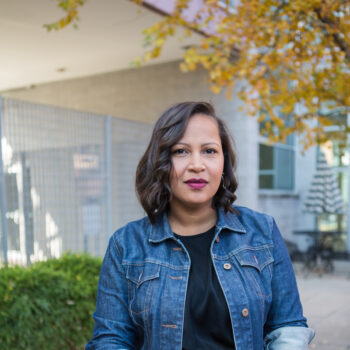Over the past few years, progressives have ushered in a slew of elected officials at the local and state levels — giving us the opportunity to build new co-governance practices in our communities. How have these officials worked with organizers and communities to advance change? What challenges have they faced along the way? Veteran political strategist Jessica Byrd sits down with three local elected officials — Tishuara Jones, the Mayor of St. Louis, Missouri; Gail Johnson, the former City Commissioner of Gainesville, Florida; and Mike Elliot, Mayor of Brooklyn Center, Minnesota— about their fights to make change in their communities and what co-governance looks like in practice. This roundtable discussion has been edited and condensed.
Jessica Byrd: Mayor Jones, what has surprised you as you’ve gotten a chance to take over the leadership of your city?
Tishaura Jones: I like to quote Hamilton lyrics sometimes in my speeches, and a lyric that I’m constantly reminded of is, “Winning is easy, governing is harder.” I learned that really quickly. We’re trying to spend over $500 million of federal funds distributed to us through the American Recovery Plan Act. We put together a process to get as much public input as possible. We went door to door to ask people what their priorities were. Governing is harder than winning, but I remain committed to righting historic wrongs in my city, to directing investment to places that haven’t seen investment in decades, to keeping our promises. Although it is hard and you will ruffle some feathers at times, this is the work that I was called to do, and this is the work that I was elected to do.
Gail Johnson: I actually recently resigned [from being a commissioner]. It was one of the most difficult decisions I’ve ever made. My policy and my activism are rooted in the community. That has made me many enemies, but I think the good kind. At the same time, I’ve found it incredibly difficult over the past 18 months, some instances where I felt deeply, deeply uncomfortable keeping my seat, consistently being in the minority. When we vote, it very much falls along racial and gender lines. For the moment, I’m going to be working on the outside and making sure that 2022 looks a lot different for our city, and people of like mind and like values can all work together to continue some of the work that I started and not be undermined at every turn.
JB: It sounds like it’s a strategy of governance. A strategy to get people’s attention, which is so brilliant and may not be immediately understood.
GJ: Yeah. It’s long term. What I realized, being in the minority the entire time on the commission, is that it’s not about me and it’s not about one other person. We can’t constantly be banging our heads against the wall to get nothing accomplished. Being in the minority, I realized how incredibly important it is to really have elected officials across multiple jurisdictions working together — city, county, state, soil and water district. That’s what we need.
TJ: The thing that I am constantly pushing back on is the historic wrongs of our city. St. Louis is one of the most hyper-segregated cities in the country. The policies of our past have directly affected the conditions that most Black and brown people in St. Louis live in to this day. There were intentional decisions made not to invest in Black and brown neighborhoods, and, as result, some of them look like bombed out war zones.
St. Louis cannot succeed if half of it is left to fail. We are a majority-minority city, and we have to lead with inclusive policies. We have to put racial equity at the center, and we have to transform those systems that have held us back for generations. I know that this sounds so cliché, but the death of George Floyd really woke a lot of people up to how we need to center race in our policies. I’ve made major changes to how we negotiate with developers. If they’re not going to include affordable housing in some of their market-rate developments, then we’re going to ask them to put money towards our Affordable Housing Trust Fund.
JB: You’re doing what sounds like reparations work through innovative, creative, solutions-oriented governing. Help us to see that picture a little bit.
TJ: Oh, I’ll give you an example of one of the latest deals that we are negotiating. A developer took an old warehouse and wanted to develop 300-plus market-rate apartments, and he wanted a 100 percent tax abatement. We said, “No. We will structure the development of the tax abatement in decreasing amounts over five-year periods, but we also want you to include affordable housing within a certain percentage of adjusted median income.” We want people to be able to live near these developments and not have to travel two hours or more on public transportation just to go to work.
Mike Elliot: I’m in a council manager system, so I actually serve as one of the bolts on the City Council, and then you’ve got a city manager that runs the daily operations. What it ends up meaning is that there’s a lot of power centered in that position. I have had to find ways to co-govern with community and to bring community in and have that be the power base from which I operate. In all of the decisions that I’ve been part of, it’s been community and organizers in the community. For instance, the Barbershop and Black Congregations Operative here in the Twin Cities has been absolutely instrumental in organizing the community. For me, governing has meant co-governing, a kind of elected official and community partnership to make things happen.
JB: Tell me about the possibilities of co-governance, but also keep it real. How does it actually function, and how should we be thinking about it as organizers wanting to co-govern with you all?
TJ: When I started a little over four months ago, we did participatory budgeting with the first $80 million of the American Recovery Act funds through a public process. The budget process actually started on my second day in office, and so we had an open discussion with anybody who wanted to talk about what their priorities were for the budget. We put more money in the Affordable Housing Trust Fund and took money out of vacant positions in the police department and put them towards more social services.
GJ: Co-governance starts before we get to the ballot box. We’re trying to do a different model of sharing resources but, most importantly, sharing policy. We are getting together right now, as a group, pretty regularly to say, “This is what we want to do when we’re elected. We’re going to learn about this, and then how are we going to do this as a team of people across the city, county, school board, and soil and water?”
ME: Sometimes the organizers need to take the lead, and sometimes I need to take the lead. It’s not me calling the shots. It’s all of us, collectively, and there’s sort of an organic give and take where everybody is okay stepping back, but at some point, all of us might call somebody forward. I think that’s the way it has to work, because the fact of the matter is, I have a certain kind of ability and power in my position, but organizers and the community and other partners, they have a certain power too. It takes all of us to push a certain set of policies forward.
JB: What I’m hearing for you all is to not just trust the process but engage in it fully. That healing and intersectionality can be conversations that happen inside our local governments and with elected leaders, and that great transformation is possible. We got to just keep showing up for it.

